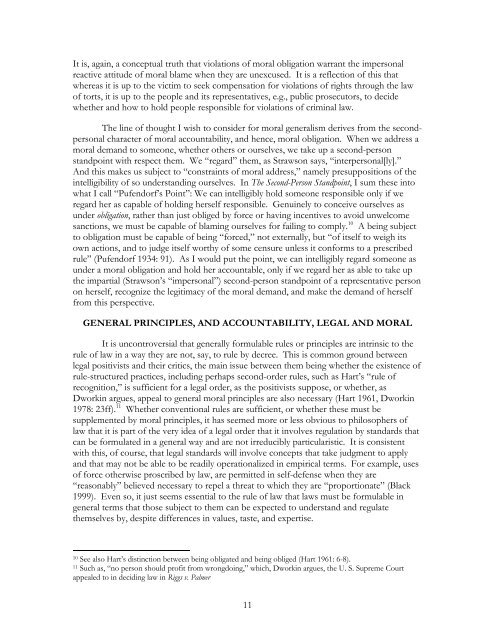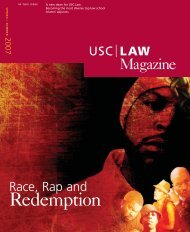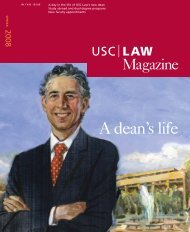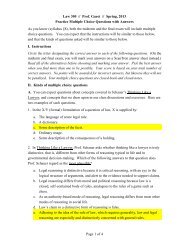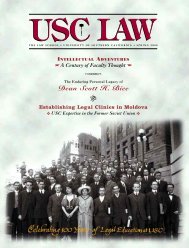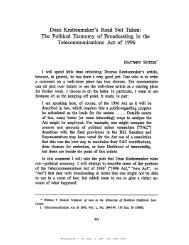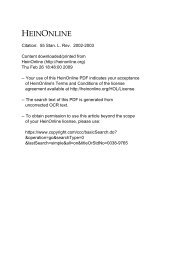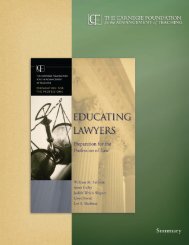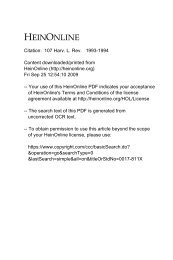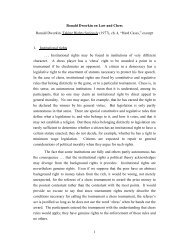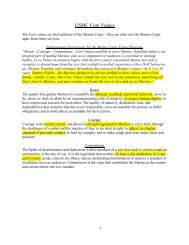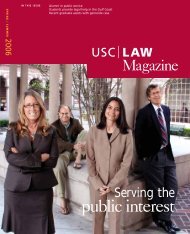1 MORALITY AND PRINCIPLE Jonathan Dancy is largely ...
1 MORALITY AND PRINCIPLE Jonathan Dancy is largely ...
1 MORALITY AND PRINCIPLE Jonathan Dancy is largely ...
Create successful ePaper yourself
Turn your PDF publications into a flip-book with our unique Google optimized e-Paper software.
It <strong>is</strong>, again, a conceptual truth that violations of moral obligation warrant the impersonalreactive attitude of moral blame when they are unexcused. It <strong>is</strong> a reflection of th<strong>is</strong> thatwhereas it <strong>is</strong> up to the victim to seek compensation for violations of rights through the lawof torts, it <strong>is</strong> up to the people and its representatives, e.g., public prosecutors, to decidewhether and how to hold people responsible for violations of criminal law.The line of thought I w<strong>is</strong>h to consider for moral general<strong>is</strong>m derives from the secondpersonalcharacter of moral accountability, and hence, moral obligation. When we address amoral demand to someone, whether others or ourselves, we take up a second-personstandpoint with respect them. We “regard” them, as Strawson says, “interpersonal[ly].”And th<strong>is</strong> makes us subject to “constraints of moral address,” namely presuppositions of theintelligibility of so understanding ourselves. In The Second-Person Standpoint, I sum these intowhat I call “Pufendorf’s Point”: We can intelligibly hold someone responsible only if weregard her as capable of holding herself responsible. Genuinely to conceive ourselves asunder obligation, rather than just obliged by force or having incentives to avoid unwelcomesanctions, we must be capable of blaming ourselves for failing to comply. 10 A being subjectto obligation must be capable of being “forced,” not externally, but “of itself to weigh itsown actions, and to judge itself worthy of some censure unless it conforms to a prescribedrule” (Pufendorf 1934: 91). As I would put the point, we can intelligibly regard someone asunder a moral obligation and hold her accountable, only if we regard her as able to take upthe impartial (Strawson’s “impersonal”) second-person standpoint of a representative personon herself, recognize the legitimacy of the moral demand, and make the demand of herselffrom th<strong>is</strong> perspective.GENERAL <strong>PRINCIPLE</strong>S, <strong>AND</strong> ACCOUNTABILITY, LEGAL <strong>AND</strong> MORALIt <strong>is</strong> uncontroversial that generally formulable rules or principles are intrinsic to therule of law in a way they are not, say, to rule by decree. Th<strong>is</strong> <strong>is</strong> common ground betweenlegal positiv<strong>is</strong>ts and their critics, the main <strong>is</strong>sue between them being whether the ex<strong>is</strong>tence ofrule-structured practices, including perhaps second-order rules, such as Hart’s “rule ofrecognition,” <strong>is</strong> sufficient for a legal order, as the positiv<strong>is</strong>ts suppose, or whether, asDworkin argues, appeal to general moral principles are also necessary (Hart 1961, Dworkin1978: 23ff). 11 Whether conventional rules are sufficient, or whether these must besupplemented by moral principles, it has seemed more or less obvious to philosophers oflaw that it <strong>is</strong> part of the very idea of a legal order that it involves regulation by standards thatcan be formulated in a general way and are not irreducibly particular<strong>is</strong>tic. It <strong>is</strong> cons<strong>is</strong>tentwith th<strong>is</strong>, of course, that legal standards will involve concepts that take judgment to applyand that may not be able to be readily operationalized in empirical terms. For example, usesof force otherw<strong>is</strong>e proscribed by law, are permitted in self-defense when they are“reasonably” believed necessary to repel a threat to which they are “proportionate” (Black1999). Even so, it just seems essential to the rule of law that laws must be formulable ingeneral terms that those subject to them can be expected to understand and regulatethemselves by, despite differences in values, taste, and expert<strong>is</strong>e.10 See also Hart’s d<strong>is</strong>tinction between being obligated and being obliged (Hart 1961: 6-8).11 Such as, “no person should profit from wrongdoing,” which, Dworkin argues, the U. S. Supreme Courtappealed to in deciding law in Riggs v. Palmer11


